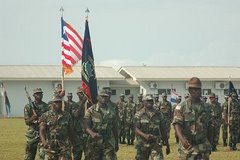
On july 26 1847 11 men, representing diffrent parts of the commonwealth of Liberia, and led by Hilary Teage, signed the Liberian Declaration of Independence. By signing the declaration of independence these men told the world that a new country, and the first free negro nation on the African continent was born. they were Samuel Benedict, Hilary Teage, Elijah Johnson, John Naustehlau Lewis, Beverly R. Wilson and J.B. Gripon from Montserrado County; John Day, Amos Herring, Anthony William Gardiner and Ephriam Titler from Grand Bassa County; and Jacob W. Prout and Richard E. Murray from Sinoe County.
So this july 26 we at home and abroad honored these patrioctic sons of Liberia for taking the first bold step in putting our country on to path to statehood.
Timeline of Key events in our country's history....
In 1822, groups of freed Black Americans from the U.S. settled on the coast of Western Africa with a grant of $100,000 from President James Monroe.
 Because of the inhumane way they were treated in America, many of the free slaves, after the American civil war of the 1860s decided to come to Africa, and start a new life.
Because of the inhumane way they were treated in America, many of the free slaves, after the American civil war of the 1860s decided to come to Africa, and start a new life. Free slaves in America preparing to come to Liberia in 1862.
Free slaves in America preparing to come to Liberia in 1862. The Elizabeth brought the first group of free slaves to Africa in1822 and settle on an island called perseverance island. today its called the providence island.
The Elizabeth brought the first group of free slaves to Africa in1822 and settle on an island called perseverance island. today its called the providence island.In 1847, these settlers established the Republic of Liberia, the first independent country in Africa, they would then call their capital Monrovia for President James Monroe.

Susanna Lewis, and seven other women design the Liberian Flag, also know as the lone star.
 The Liberian president residence as it looked in 1850.
The Liberian president residence as it looked in 1850. The Liberian cabinet in the late 1800s.
The Liberian cabinet in the late 1800s. Liberian 2 dollars of 1880.
Liberian 2 dollars of 1880.1917 - Liberia declares war on Germany, giving the Allies a base in West Africa.

The city of Monrovia at the turn of the century, it was partially destroyed by a German U-boat when Liberia joined America and the allies in the first world war.
1926 - Firestone Tire and Rubber Company opens rubber plantation on land granted by government. Rubber production becomes backbone of economy.
1936 - Forced-labour practices abolished.
1943 - William Tubman elected president.
1944 - Government declares war on the Axis powers.

President Edwin Barclay of Liberia chats with U.S president F.D.R
1951 May - Women and indigenous property owners vote in the presidential election for the first time.
1958 - Racial discrimination outlawed.
1971 - Tubman dies and is succeeded by William Tolbert Jr.
1979 - More than 40 people are killed in riots following a proposed increase in the price of rice
1980 - Master Sergeant Samuel Doe stages military coup. Tolbert and 13 of his aides are publicly executed. A People's Redemption Council headed by Doe suspends constitution and assumes full powers.
1989 - National Patriotic Front of Liberia (NPFL) led by Charles Taylor begins an uprising against the government.

1990 - Economic Community of West African States (Ecowas) sends peacekeeping force. Doe is executed by a splinter group of the NPFL.
2003 August - Nigerian peacekeepers arrive. Charles Taylor leaves Liberia after handing power to his deputy Moses Blah. US troops arrive. Interim government and rebels sign peace accord in Ghana. Gyude Bryant chosen to head interim administration.
2005 23 November - Ellen Johnson-Sirleaf becomes the first woman to be elected as an African head of state. She takes office the following January.

Happy birthday Liberia, and Happy independence day to all my countrymen at home and all across the globe, our country turn 161 years old on the 26 of July this year, let us again reflect on the last 2 decades of our country's recent past, and pray for the almost 200,000 of our countrymen who died in a senseless war,all the while holding our heads up high, for the future holds nothing but possibilities, and always rembering the words of our national anthem, In union strong success is sure, we cannot fail, and that we are all in the same boat together, one nation, one people, and one commom destiny. God bless us all.




































5 comments:
Great historical images/photos. They really add to your post.
Thanks for sharing.
Excellent. I really enjoyed this overview and I agree with Joy Hancock that you presented some great historical images and photos. I look forward to your next postings!
As always an excellent posting.The
way you write is awesome.Thanks. Adding more information will be more useful.
Bathmate
Thanks man for ur effort.
thanksgiving in usa
thanksgiving history
thanksgiving uk 2017
does the uk celebrate thanksgiving
thanksgiving origin
does england have thanksgiving
why do we celebrate thanksgiving
canadian thanksgiving
Thanksgiving Day in United Kingdom
Post a Comment